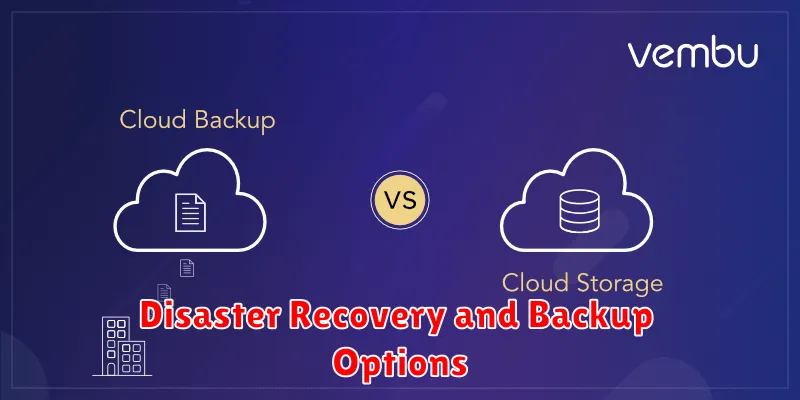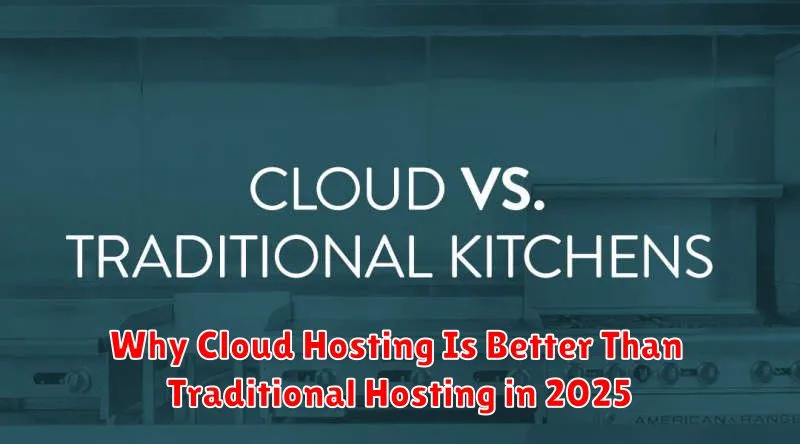In today’s rapidly evolving digital landscape, businesses face the crucial decision of selecting the right hosting solution to power their online presence. Choosing between cloud hosting and traditional hosting can significantly impact scalability, performance, and overall cost-effectiveness. This article will delve into the compelling reasons why cloud hosting emerges as the superior choice over traditional hosting in 2025, offering unparalleled advantages for businesses of all sizes. We will explore the key differences between these two hosting paradigms and analyze how cloud hosting‘s flexibility, scalability, and cost-efficiency make it the ideal solution for navigating the demands of the modern digital world.
As we progress further into 2025, the benefits of cloud hosting become increasingly pronounced. Businesses seeking optimal performance, enhanced security, and greater control over their resources are turning to cloud solutions in droves. The limitations of traditional hosting, such as fixed resources and susceptibility to hardware failures, are becoming increasingly apparent. This article will illuminate the specific advantages of cloud hosting, including its ability to handle traffic spikes, its enhanced security measures, and its pay-as-you-go pricing model, making it a more attractive and future-proof option for businesses looking to thrive in the competitive online marketplace of 2025 and beyond.
Understanding Traditional vs Cloud Hosting
Choosing the right hosting solution is crucial for any website. Traditionally, websites relied on physical servers, also known as dedicated or shared hosting. With this model, resources are limited to the capacity of the individual server.
Cloud hosting, on the other hand, utilizes a network of interconnected servers to host websites. This offers a more flexible and scalable approach. Resources can be dynamically allocated as needed, meaning websites can handle traffic spikes without performance degradation.
A key difference lies in resource allocation. Traditional hosting pre-allocates fixed resources, while cloud hosting allows for on-demand resource provisioning. This affects cost-effectiveness, as traditional hosting often involves paying for unused resources.
Scalability is another differentiator. Scaling a traditional server requires manual intervention, such as upgrading hardware. Cloud hosting, however, allows for automatic scaling, responding to traffic fluctuations seamlessly. This contributes to improved reliability and uptime.
Key Advantages of Cloud Hosting Today
Cloud hosting offers several key advantages over traditional hosting solutions. Scalability is a primary benefit, allowing resources to be easily adjusted to meet fluctuating demands. This eliminates the need to over-provision hardware for peak usage, resulting in cost savings.
Reliability is another significant advantage. Cloud providers utilize redundant infrastructure, minimizing downtime and ensuring business continuity. If one server fails, another seamlessly takes over. This distributed nature also enhances security by protecting against data loss due to localized hardware issues.
Flexibility is also a hallmark of cloud hosting. Businesses can choose from a variety of service models (IaaS, PaaS, SaaS) and operating systems to meet their specific needs. This allows for greater control and customization than traditional hosting.
Finally, cloud hosting simplifies management. Providers handle infrastructure maintenance, security updates, and other backend tasks, freeing up businesses to focus on their core operations.
Flexibility and On-Demand Scaling
One of the most significant advantages of cloud hosting over traditional hosting is its inherent flexibility. Cloud environments allow businesses to easily adapt their resources to fluctuating demands. This eliminates the need for costly over-provisioning with traditional hosting, where businesses must anticipate peak usage and purchase hardware accordingly.
On-demand scaling is a cornerstone of this flexibility. If your website experiences a sudden surge in traffic, cloud hosting automatically allocates additional resources like processing power and memory to maintain performance. Conversely, during periods of lower traffic, resources are scaled back down, ensuring you only pay for what you use.
This dynamic scalability offers unparalleled agility, enabling businesses to respond quickly to market changes and growth opportunities without worrying about infrastructure limitations. It also contributes significantly to cost efficiency by optimizing resource utilization and minimizing wasted capacity.
Disaster Recovery and Backup Options

Disaster recovery is a crucial aspect of any hosting solution. Cloud hosting offers superior disaster recovery capabilities compared to traditional hosting. Traditional hosting often relies on single points of failure, making it vulnerable to outages. With cloud hosting, data is replicated across multiple servers and data centers. This redundancy ensures business continuity even if one location experiences an outage.
Cloud providers offer various backup options that are automated and scalable. These backups can be easily restored, minimizing downtime in case of data loss. Traditional hosting often requires manual backups, which can be time-consuming and prone to human error. Cloud hosting’s automated backups ensure data is regularly backed up and easily accessible when needed.
Recovery Time Objective (RTO) and Recovery Point Objective (RPO) are significantly improved with cloud hosting. Cloud providers typically offer robust Service Level Agreements (SLAs) guaranteeing minimal downtime and data loss. This level of resilience is difficult and expensive to achieve with traditional hosting infrastructure.
Performance in High-Traffic Scenarios
A key advantage of cloud hosting over traditional hosting lies in its ability to handle traffic spikes. Traditional hosting, relying on a single server, can become overwhelmed during periods of high traffic, leading to slow loading times and even crashes. Cloud hosting, however, leverages a distributed network of servers. This allows it to automatically scale resources up or down to meet demand.
When traffic surges, the cloud platform automatically distributes the load across multiple servers, ensuring consistent performance and preventing downtime. This dynamic scalability is crucial for businesses expecting fluctuating traffic patterns, such as e-commerce sites during sales or news websites during major events. In contrast, traditional hosting often requires manual intervention to increase server capacity, a process that can be slow and disruptive.
Cloud hosting’s superior performance in high-traffic scenarios translates directly to a better user experience. Fast loading times and uninterrupted service keep visitors engaged and contribute to higher conversion rates. For businesses where online presence is paramount, the reliability and scalability of cloud hosting prove invaluable in maintaining a competitive edge in the digital landscape.
Environmental and Cost Benefits
Cloud hosting offers significant environmental advantages over traditional hosting. By consolidating resources and utilizing virtualization, cloud providers achieve higher server utilization rates. This reduces the overall energy consumption required to power and cool data centers, minimizing the carbon footprint associated with web hosting. Furthermore, many cloud providers are actively investing in renewable energy sources to power their operations, further enhancing their environmental sustainability.
From a cost perspective, cloud hosting provides compelling benefits. Traditional hosting involves substantial upfront investments in hardware, software, and infrastructure. Cloud hosting eliminates these capital expenditures, shifting the cost model to a pay-as-you-go operational expense. This allows businesses to scale their resources up or down as needed, only paying for the resources they consume. Additionally, the reduced need for in-house IT staff to manage and maintain physical servers contributes to significant cost savings.
Is It Time to Switch?
Migrating to cloud hosting can be a significant decision for your business. Evaluating your current hosting situation against the advantages of the cloud is crucial. Are you experiencing consistent performance issues with your traditional hosting? Is scalability a growing concern as your business expands? These are strong indicators that a switch might be beneficial.
Consider your budget. While cloud hosting offers a pay-as-you-go model, it’s essential to accurately estimate your resource needs to avoid unexpected costs. Evaluate the security aspects of both options. Cloud providers often invest heavily in security infrastructure, but understanding their shared responsibility model is crucial.
Finally, assess the technical expertise required for each platform. Managing a cloud environment can be more complex than traditional hosting. Determine if your team has the necessary skills or if managed cloud services are a better fit. By carefully considering these factors, you can make an informed decision about whether switching to cloud hosting is the right move for your business in 2025.

